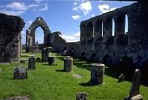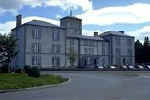Roscommon
Jail
Adjacent is the massive building of
solid stone, once the county jail. It had the distinction of having a hangwoman
in the person of "Lady Betty", a criminal who had her sentence for
murder withdrawn on condition that she carried out the hangman’s task, without
fee or reward. According to local records, the jail was built in the early 1740s
and was owned by the Roscommon landlord, the Earl of Essex. The building served
as a jail for less than a century. It subsequently became a lunatic asylum, then
a refuge for smallpox sufferers and later a private house. The Jail has been
totally rebuilt, although the front facade has been retained, and now houses an
arcade of shops and restaurant on the ground floor with living apartments on the
upper floors.
Roscommon
Castle
![tour-ros-castle[1].jpg (6446 bytes)](images/tour-ros-castle1_small.jpg) Located
on a hillside just outside the town, Roscommon castle is quadrangular in shape,
it had four corner D-shaped towers, three storeys high, and twin towers at its
entrance gateway, one of which still retains its immensely sturdy vaulted roof.
The entire castle was enclosed by a lofty curtain wall. It was built in 1269 by
Robert de Ufford, Justiciar of Ireland, on lands he had seized from the
Augustinian Priory. The castle had a most chequered history. It was besieged by
Connacht King Aodh O’Connor in 1272. Eight years later it was again in the
hands of an English garrison, and fully repaired. By 1340 the O’Connor’s
regained possession of it, and, except for a few brief intermissions, they held
it for two centuries until 1569, when Sir Henry Sidney, Lord Deputy seized it.
It was granted to Sir Nicholas Malbie, Elizabethan Governor of Connaught, in
1578. Two years later the interior was remodelled and large mullioned windows
were inserted in the towers and curtain walls. Again, in 1641 the
Parliamentarian faction gained it until Confederate Catholics under Preston
captured it in 1645. It remained in Irish hands until 1652 when it was partially
blown up by Cromwellian "Ironsides" under Commissary Reynolds, who had
all the fortifications dismantled. It was finally burned down in 1690, and, from
the closing years of the 17th century, it gradually fell into decay.
It is still quite an impressive sight, nevertheless. A symmetrical moat some
distance from the curtain walls surrounded the entire castle and safeguarded it.
It s now a national monument.
Located
on a hillside just outside the town, Roscommon castle is quadrangular in shape,
it had four corner D-shaped towers, three storeys high, and twin towers at its
entrance gateway, one of which still retains its immensely sturdy vaulted roof.
The entire castle was enclosed by a lofty curtain wall. It was built in 1269 by
Robert de Ufford, Justiciar of Ireland, on lands he had seized from the
Augustinian Priory. The castle had a most chequered history. It was besieged by
Connacht King Aodh O’Connor in 1272. Eight years later it was again in the
hands of an English garrison, and fully repaired. By 1340 the O’Connor’s
regained possession of it, and, except for a few brief intermissions, they held
it for two centuries until 1569, when Sir Henry Sidney, Lord Deputy seized it.
It was granted to Sir Nicholas Malbie, Elizabethan Governor of Connaught, in
1578. Two years later the interior was remodelled and large mullioned windows
were inserted in the towers and curtain walls. Again, in 1641 the
Parliamentarian faction gained it until Confederate Catholics under Preston
captured it in 1645. It remained in Irish hands until 1652 when it was partially
blown up by Cromwellian "Ironsides" under Commissary Reynolds, who had
all the fortifications dismantled. It was finally burned down in 1690, and, from
the closing years of the 17th century, it gradually fell into decay.
It is still quite an impressive sight, nevertheless. A symmetrical moat some
distance from the curtain walls surrounded the entire castle and safeguarded it.
It s now a national monument.
Sacred
Heart Church
The Sacred Heart Church dominates the
town. The church spire is 52 m high. Built of local cut stone and opened in
1903, it was completed in 1925. The church is built on rising ground and fronted
by a sunken grotto. Over the main door is a fine example of mosaic, carried out
by the Italian firm of Salviate, depicting two bishops of Elphin connected with
the building of the church. The interior is equally impressive and contains a
replica of the Cross of Cong. This wonderful example of Irish Craftsmanship was
made in Fuerty between 1120 - 1123.
Roscommon
Abbey
 In this Dominican Priory, founded in
1253, a late 13th century effigy of its founder Felim O’Conor is
placed upon a later 15th century tomb with eight mail-clad warriors
representing gallowglasses, medieval Irish professional soldiers. Famous in
early Christian days as a seat of learning under Abbot Coman, it has close ties
with St. Ciaran and Clonmacnois. The Dominican priory, the ruins of which still
stand, was founded in 1253 by Felim O’Conor, King of Connaught and consists of
a church 42m long and 10m wide. Notwithstanding the suppressions of the 16th
and 17th centuries, the Dominicans held their community together and
its two last survivors died as parish priests of Fuerty and of Athleague in 1830
and 1872 respectively.
In this Dominican Priory, founded in
1253, a late 13th century effigy of its founder Felim O’Conor is
placed upon a later 15th century tomb with eight mail-clad warriors
representing gallowglasses, medieval Irish professional soldiers. Famous in
early Christian days as a seat of learning under Abbot Coman, it has close ties
with St. Ciaran and Clonmacnois. The Dominican priory, the ruins of which still
stand, was founded in 1253 by Felim O’Conor, King of Connaught and consists of
a church 42m long and 10m wide. Notwithstanding the suppressions of the 16th
and 17th centuries, the Dominicans held their community together and
its two last survivors died as parish priests of Fuerty and of Athleague in 1830
and 1872 respectively.
Roscommon
Library
 One
of the most modern Library Headquarters and Branch Libraries in the country,
Roscommon Co. Library is housed in the building known as the Old Infirmary. This
impressive building was built in 1783 from an endowment from Mrs. Laetitia
Walcott, a woman of considerable substance. The original building was of
limestone, three storied over a basement, with slated roof and plain limestone
dressings around the windows. The two symmetrical pavilions on the North and
South ends of the central portion were constructed after 1832. The South
Pavilion incorporated the physician’s residence with an entrance to the front
of the building, with carved door case and steps. Other renovations were carried
out to the building in 1902 and 1929. It continued to be used as a hospital
until 1941, when the new county hospital was built. Major reconstruction work
began in 1989 and was completed at a cost of £1,200,000. The result is a
beautiful building, well worth a visit particularly if you are interested in
researching your Roscommon roots. The Library houses a wealth of archival
material.
One
of the most modern Library Headquarters and Branch Libraries in the country,
Roscommon Co. Library is housed in the building known as the Old Infirmary. This
impressive building was built in 1783 from an endowment from Mrs. Laetitia
Walcott, a woman of considerable substance. The original building was of
limestone, three storied over a basement, with slated roof and plain limestone
dressings around the windows. The two symmetrical pavilions on the North and
South ends of the central portion were constructed after 1832. The South
Pavilion incorporated the physician’s residence with an entrance to the front
of the building, with carved door case and steps. Other renovations were carried
out to the building in 1902 and 1929. It continued to be used as a hospital
until 1941, when the new county hospital was built. Major reconstruction work
began in 1989 and was completed at a cost of £1,200,000. The result is a
beautiful building, well worth a visit particularly if you are interested in
researching your Roscommon roots. The Library houses a wealth of archival
material.
More Info Needed:
Need info on all the important buildings and natural heritage (the lough
etc.) with pics.
Castle, Abbey, Catholic & Protestant Church, the Library, The Old Jail,
The Museum, The Courthouse, Bully's Acre, The County Home/Workhouse, The Chomain
(?) Field
The Lough
Mote Park
Need Maps (current, historical, trials), pics, docs - links to article
General History
Need help from Historical Society here - publish some articles (eg by D.M. or
J.K. perhaps or have part articles and advertisments to their Journal)







